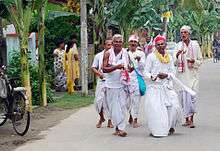Ojapali
Ojapali is a traditional Shamanistic type of indigenous folk dance from the Assam Northeastern region of India. Ojapali is believed to have evolved from Kathakata tradition and is performed in a group; it is believed to be one of the oldest art forms of Assam. Originally evolved in the Kamata state the western and northern part of river Brahmaputra later limited to Darang area under the patronisation of Darangi King Dharmanarayana. The repertoire of this performance consists of songs, dialogues, gesture, improvised acting and dramatisation etc. The group member consisted of an Oja, who lead the performance and four or five palies, who supplements the performance with continuous rhythm by playing cymbal. Among the Palies Daina pali who stand on the right-hand side of the Oja is the active one and he and Oja gets the performance forward. Many beliefs that Xonkordev also takes the inspiration from Ojapali to create his Ankiya Bhaona. More over he also create his own Sattriya Ojapali. Generally Darangi Suknanni Ojapali sings the lyrics written by Sukabi Narayanadeva in Padmapurana. Padma Purana covers the story of serpent goddess Maroi.

Present day Ojapali is very limited to Darang, Bajali, Baksa, Mangaldoi,Sipajhar, some other parts of Tezpur and Udalguri district. Lalit chandra Nath and Kinaram Nath have been awarded Sangeet Natak Akademi Award for their contribution to this art form. Presently Lalit Chandra Nath Oja's family are working towards Ojapali's development in Sipajhar District. [1][2]
Ojapali can be divided into three forms based on the occasion and style:
Noted personalities
- Manka[5][6]
- Durgabar Kayastha
- Pitambar
- Barbyahu[7]
- Sarubyahu
- Lalit Chandra Nath, also known as Lalit Oja (Sangeet Natak Akademi Award winner)[8]
- Manka[9]
- [10]
References
- TI Trade. "Assam Tribune online". Assamtribune.com. Archived from the original on 5 September 2009. Retrieved 26 December 2012.
- "Oja-Pali Assam | Oja-Pali Dance Of Assam | OjaPali Dance Of Assam | Traditional Dance Of Assam | Assamese Culture". Assaminfo.com. Retrieved 7 June 2013.
- "Oja-Pali in India". India9.com. 7 June 2005. Retrieved 7 June 2013.
- Maheswar Neog (1980). Early History of the Vaiṣṇava Faith and Movement in Assam: Śaṅkaradeva and ... - Maheswar Neog - Google Books. ISBN 9788120800076. Retrieved 7 June 2013.
- Archived September 5, 2009, at the Wayback Machine
- Fare, Eastern (31 December 2010). "North-East India | NE Blog: Ojapali – A performing art form of Assam". Neblog.in. Retrieved 7 June 2013.
- "Artiste dedicated to oja pali, body and soul". Telegraphindia.com. 10 September 2012. Retrieved 7 June 2013.
- Debajit Bora (2016). "Politics of performance and the creation of Darangi identity:looking at the ojapali performance of Assam- Debajit Bora - Rouledge". Research in Drama Education: The Journal of Applied Theatre and Performance. 21 (4): 465–470. doi:10.1080/13569783.2016.1220245.
- {{cite web|https://www.youtube.com/watch?v=No9vpuvnUMQ |title=Theatre of the People |publisher=Sur Samalaya Resource centre for Arts}